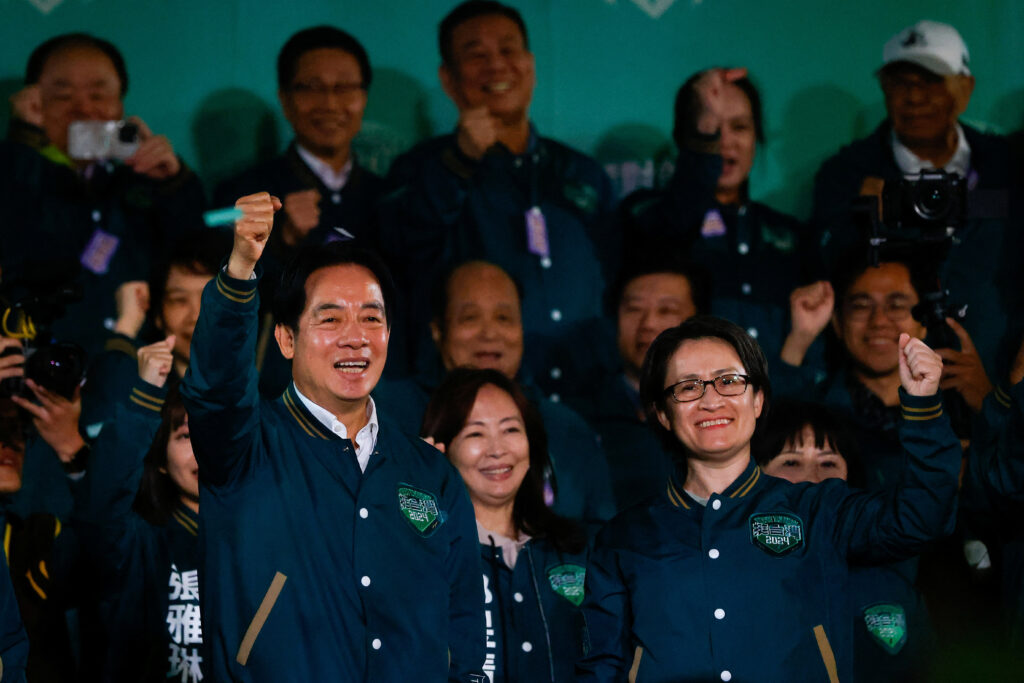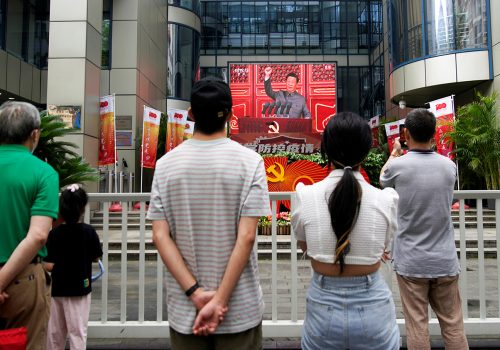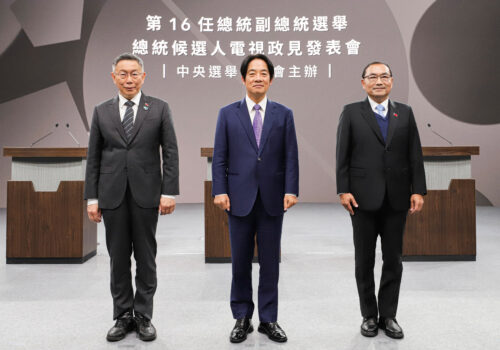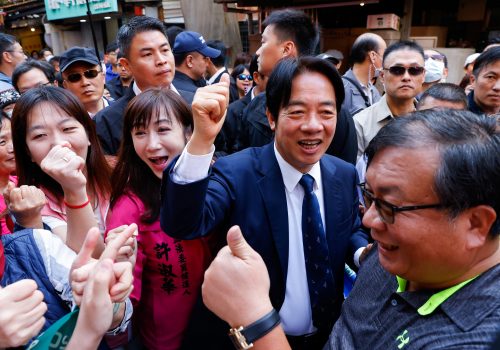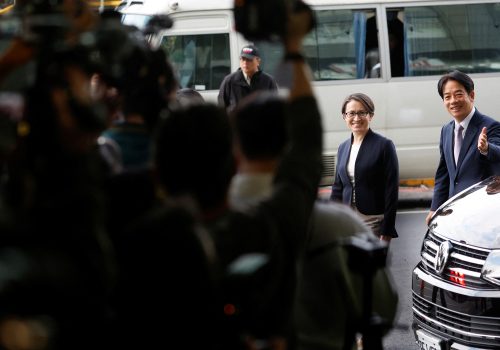In a year packed with global elections, “Taiwan has scored the first victory for democracy.” That was the assessment of Lai Ching-te on Saturday, after Taiwanese voters elected him the island democracy’s next president, marking an unprecedented third consecutive win for his Democratic Progressive Party (DPP). Lai, the current vice president who campaigned on maintaining close ties to Washington and continuity with the policies of President Tsai Ing-wen, overcame two rival parties’ candidates, as well as repeated claims from Beijing that a DPP victory would threaten peace in the Taiwan Strait.
Below, Atlantic Council experts explain what a Lai presidency will mean for Taiwan’s foreign policy trajectory—and how China is likely to respond.
Click to jump to an expert analysis:
Wen-Ti Sung: Raising Beijing’s ire, the DPP must overcome domestic divides
Kenton Thibaut: Expect Beijing to enact consequences on Taiwan
Markus Garlauskas: Taiwan’s people are not as easily intimidated as many feared
Frederick Kempe: Xi’s biggest problem isn’t Taiwan
Jeremy Mark: For Taiwan’s economy, it will be business as usual
Ryo Hinata-Yamaguchi: Lacking a clear majority from voters, Lai may have to adjust
Hung Tran: China’s reaction could add another headwind to the global economy
Raising Beijing’s ire, the DPP must overcome domestic divides
The DPP has made it clear that on the spectrum of US-China relations, the party will double down on US-Taiwan ties. Therefore, in the short term, a DPP victory will likely be met with Beijing’s rhetorical critique, more targeted economic sanctions against select Taiwanese exports, and an intimidating show of force through military exercises and gray zone security maneuvers. All of these likely actions will signal Beijing’s displeasure against the electoral outcome and to pre-emptively “anchor” the terms of subsequent interactions between Beijing and the next DPP administration.
In the long term, it will be important for the DPP to effectively work with the opposition in a divided legislature. If it can overcome the constraints imposed by Taiwan’s internally divided government, the next DPP government will be better able to negotiate with Beijing from a position of strength and have a better shot at rebuilding a working (albeit cold) relationship, reopening lines of communication between Beijing and Taipei, which is essential for stabilizing the region.
—Wen-Ti Sung is a nonresident fellow with the Atlantic Council’s Global China Hub.
Expect Beijing to enact consequences on Taiwan
In the lead-up to the election, China capitalized on real fears in Taiwan’s public discourse over cross-strait tensions to promote the narrative that a vote for the ruling DPP party would inevitably lead to war. The nationalist Kuomintang’s (KMT) candidate, Hou Yu-ih, depicted the vote as a choice between “war and peace”—stating that the DPP’s moves to deepen ties with the United States and pursue a path of independence will lead to conflict with China. Chinese state-linked actors picked up on this narrative and amplified it within Taiwan’s information environment.
For just one example, the Atlantic Council’s Digital Forensic Research Lab found that China-based media companies have purchased ads on Meta’s Facebook, one of the most highly used platforms in Taiwan, to push the narrative that DPP candidate Lai is a lackey of the United States, and that a vote for Lai would lead Taiwan down the path of war. Ironically, China has pointed to its own aggressive actions in the Taiwan Strait to support the narrative that a vote for the DPP would lead to war; for example, it highlighted the military exercises the People’s Liberation Army Navy conducted in the Taiwan Strait following then-US Speaker of the House Nancy Pelosi’s 2022 visit as the inevitable result of the United States and the DPP challenging the status quo on Taiwan. China has also leveraged this messaging in the broader Asia-Pacific region, portraying the United States as a fickle partner whose Taiwan policy is destabilizing the entire region. Post-election, we can expect Beijing to enact consequences on Taiwan for a DPP victory—and to create the evidence to support its own narratives. Economic coercion, increasing tensions in the security sphere, and strategic deployment of the narrative that DPP and US actions are destabilizing the Asia-Pacific region and leading to conflict are sure to follow.
—Kenton Thibaut is a senior resident China fellow at the Atlantic Council’s Digital Forensic Research Lab (DFRLab).
Taiwan’s people are not as easily intimidated as many feared
The Chinese Communist Party (CCP) tried to interfere in the outcome of Taiwan’s presidential election openly and in insidious ways, as many other experts—including the Atlantic Council’s Kenton Thibaut above—have noted. An important overall theme was to attempt to intimidate voters into voting against Lai by presenting a Lai victory as holding dire consequences. In the words of one senior CCP official, Beijing was warning that the election presented a choice between “peace and war, prosperity and decline.” In an official statement covered by foreign media, Beijing’s Taiwan Affairs Office even warned of the ”extreme danger of Lai Ching-te’s triggering of cross-Strait confrontation and conflict.”
This approach helped Beijing to shape how the global media portrayed the election, much like how it has often managed to frame meetings between US and Taiwanese officials as being dangerous and destabilizing. Many of the headlines about the election, even from outlets that could hardly be described as pro-CCP, echoed Beijing’s themes about war versus peace and the dangers of a Lai victory. With their votes, the people of Taiwan appear to have rejected this framing, and similarly the rest of the world should not let Beijing define the narrative.
Ultimately, Beijing’s effort at intimidation did not frighten the populace of Taiwan into voting against Lai. It may have even backfired. It would not be surprising if pollsters end up finding that Beijing’s tactics actually led to more support for Lai—much like its strongarm tactics against Seoul led to surging anti-China sentiment in South Korea.
The outcome of this election shows that the people of Taiwan are not as easily intimidated as Beijing might like to believe, and as many in the United States seem to fear. Rather, it is very likely that Taiwan will maintain the status quo of democratic “self governance” without formal independence—to include a refusal to bow to Beijing’s preferences on key political matters—for years to come. That is not to say Taiwan will be entirely immune to the CCP’s threats. The leaders of Taiwan, despite rising support for independence, will also likely continue to believe that challenging the status quo with full “independence” is entirely unnecessary, undesirable, or too risky.
Whether or not Beijing itself chooses to attempt to change that status quo in its favor by use of military force through blockade or invasion, this election demonstrates that it is very unlikely to be able to subjugate Taiwan through intimidation alone. CCP threats and saber-rattling in the months ahead should not intimidate the rest of the world, either. Instead, Taiwan, along with the United States and its allies and like-minded partners, should accelerate preparations to deter and defeat China if it moves from intimidation to violence—including deterring nuclear escalation or a two-front war with China and North Korea.
—Markus Garlauskas is the director of the Indo-Pacific Security Initiative at the Scowcroft Center for Strategy and Security. He is a former senior US government official with experience as an intelligence officer and strategist, including twelve years stationed overseas in the region.
Xi’s biggest problem isn’t Taiwan
As these elections approached, many wrote about Chinese leader Xi Jinping’s growing threats to Taiwan’s vibrant, free-market democracy. But I had been struck by how these elections have exposed Xi’s greater concern: authoritarian failure at home.
If Chinese Communist Party leadership was working, Xi would have had a more benign view of Taiwan’s elections, shrugging his shoulders at the race rather than his government calling it “a choice between war and peace.”
What goes unsaid is that China faces some of the lowest growth and highest youth unemployment since Xi took over as paramount leader in 2012. At the same time, Xi is purging the People’s Liberation Army, ostensibly over corruption but always about control. Just as China’s economy is sputtering, Taiwan—through semiconductor manufacturing and beyond—is now a global economic power player.
Xi has made the purpose of his leadership that of national revival, which was at the core of his New Year’s speech. The harder that looks to achieve at home, the more tempting it may become to force Taiwan, with its population of about 24 million people, into China’s embrace, with its population of 1.4 billion.
Read more from Atlantic Council President and CEO Frederick Kempe.
For Taiwan’s economy, it will be business as usual
The election results point to a continuation of the status quo in the Taiwan Strait. Politically, that likely means four more years without cross-strait talks, more threatening military demonstrations by China, and lots of heavy breathing from Beijing’s propaganda apparatus. But economically, it will be business as usual. Taiwan will still rely on China as its largest export market, while the mainland will continue to lean on imports of Taiwanese semiconductors and other electronics, along with the jobs generated by Taiwanese investors. That situation is unlikely to change for the foreseeable future, especially as China experiences a sharp economic slowdown.
But the status quo also means that Beijing will continue to use economic levers to try to coerce Taiwanese businesses—if not the Taiwanese government. China has “punished” various sectors of Taiwan’s economy over the past few years, most recently in December by imposing tariffs on some chemical imports. But these sanctions do not hit Taiwan’s mainstay exports—especially the advanced semiconductors Taiwan’s world-leading chipmakers are still allowed to sell under US technology-export restrictions on China. It is possible that Beijing could go so far as to cancel a 2010 Economic Cooperation Framework Agreement that provided tariff-free entry for several hundred categories of Taiwanese goods. But such an action would also largely affect smaller amounts of exports.
Another policy that likely will continue after the election will be outgoing President Tsai Ing-wen’s efforts to encourage Taiwanese businesses to diversify their export markets and investment away from China. This trend, which has accelerated as US-China political tensions intensify and uncertainty grows about Beijing’s economic policies, has resulted in Taiwan’s investment in Southeast and South Asia surpassing new investments across the Taiwan Strait.
—Jeremy Mark is a nonresident senior fellow with the GeoEconomics Center. He previously worked for the IMF and the Asian Wall Street Journal.
Lacking a clear majority from voters, Lai may have to adjust
Lai’s victory in Saturday’s presidential election is significant not only in the context of cross-strait ties and regional security, but more so in reflecting the complex debates and developments in Taiwanese domestic politics.
For the ruling DPP, Lai’s victory is the third consecutive, and fifth victory out of eight direct presidential elections since 1996, outperforming the KMT. But while Lai seemed to have the advantage in most polls leading up to the election, he faced significant challenges. First, Saturday’s election was a three-way race, with the Taiwan People’s Party serving as an alternative in the usual “blue-versus-green” divide in Taiwan. Second, the DPP’s credibility was also put to the test, where despite the generally positive support for the Tsai Ing-wen administration and the DPP, there were mixed views over domestic economic issues. Third, China capitalized on the heated debates within Taiwan, and although it did not exert its military leverage like in the Third Taiwan Strait Crisis of 1995-1996, it tried to intimidate voters and influence votes by referring to Lai as an independence activist who will exacerbate cross-strait tensions.
Although Lai’s victory under such circumstances reflects how the DPP is the preferred choice, the fact that he failed to secure a majority of the votes means that he has not received a clear mandate from the voters. Hence, even if the Lai administration works to carry on much of the policies of its predecessor, it will face strong pressure to perform and may need to strategically adjust some of its policies going forward.
Regarding China, Beijing could intensify its cocktail of political, military, and economic leverage against the Lai administration while courting the opposition, which will further complicate Taiwanese domestic politics and intensify tensions between Beijing and Taipei, but also destabilize the Indo-Pacific security environment.
—Ryo Hinata-Yamaguchi is a nonresident senior fellow with the Atlantic Council’s Indo-Pacific Security Initiative in the Scowcroft Center for Strategy and Security.
Taiwan’s voters chose experience on the presidential ticket, but the legislature is a muddle
Despite discontent with the high cost of housing, low wages, inflation, and some political fatigue with the DPP, voters in Taiwan favored the DPP over its competitors, choosing a team that has both domestic and international experience. As Taiwan’s vice president for the past eight years, Lai Ching-te has substantial experience handling domestic issues, while his running mate Hsiao Bi-khim’s experience as Taiwan’s ambassador to the United States brings foreign relations heft to the team. So, despite some misgivings about keeping the DPP in power in the executive branch for an unprecedented third term, it appears that experience ruled the day.
Now that the presidency has been determined, all eyes are on the legislative Yuan. So far, no party has a legislative majority. The DPP has a plurality, but it’s slowly shrinking as the Taiwan People’s Party (TPP) takes some seats away from the DPP. It’s possible that the Kuomintang (KMT), if its results hold steady, will gain a plurality, and that former Kaohsiung mayor and 2020 KMT presidential candidate Han Kuo-yu could become president of the Legislative Yuan. It increasingly looks like no party will have a majority, leaving the TPP as a crucial coalition partner to any party that gains a plurality of seats. That makes the TPP very powerful.
—Elizabeth Larus is an incoming nonresident senior fellow at the Global China Hub with decades of experience researching and analyzing the domestic politics and foreign relations of Taiwan, China, and Japan.
China’s reaction could add another headwind to the global economy
Lai has secured an unprecedented third presidential term for the ruling DPP, despite substantial interference from China, which portrayed the election as choosing between war and peace. However, Lai won with 40 percent of the vote, meaning the combined votes of the opposition parties—the KMT and TPP—have almost reached 60 percent. This reflects the reality that most voters in Taiwan cherish their de facto independence and freedom but want to see an easing of tension with China. Furthermore, the DPP has lost its majority in the Legislative Yuan—weakening the hand of the new president.
Having labeled both Lai and his vice president-elect Hsiao “the separatist duo,” China may feel compelled to make its displeasure known in more tangible ways. Most likely, China will step up interference including misinformation campaigns to obstruct the new administration, especially in Parliament—in particular when it comes to legislation to authorize money to purchase arms from the United States.
More importantly, and depending on policy statements made by the president-elect between now and when he assumes office in May, China may want to take initial steps in a maritime blockade of Taiwan—this being viewed as a less risky, more implementable and thus preferable option for China, according to a recent Atlantic Council report. As Taiwan is a vital part of global commerce, supplying 63 percent of semiconductor chips and 73 percent of advanced chips worldwide, even a partially applied maritime blockade can have a noticeable impact on the availability and prices of goods being shipped to and from Taiwan. This uncertainty would add another headwind to the global economy, which is already confronted with the risk of the expanding conflict in the Middle East boosting oil and gas prices, among other things.
Taken together, these global geopolitical risks would reinforce the downside risks to the World Bank’s recent dismal estimate of 2.4 percent growth for the global economy in 2024–completing the weakest first half of a decade since the 1990s.
—Hung Tran is a nonresident senior fellow with the Atlantic Council’s GeoEconomics Center, former executive managing director at the Institute of International Finance, and former deputy director at the International Monetary Fund.
Further reading
Wed, Jan 3, 2024
Why Beijing’s latest pre-election attempt to coerce Taiwanese voters could backfire
New Atlanticist By Lev Nachman, Wen-Ti Sung
China recently said that it would end preferential tariff terms for some Taiwanese chemical exports. But the move may drive some Taiwanese voters away from the direction Beijing wants.
Tue, Dec 19, 2023
What to know about China’s meddling in Taiwan’s upcoming election
New Atlanticist By Lev Nachman, Wen-Ti Sung
China's approach to spreading misinformation to influence Taiwan's upcoming elections has become more subtle and, perhaps, more effective.
Tue, Dec 5, 2023
Meet Taiwan’s presidential candidates and their running mates
New Atlanticist By Wen-Ti Sung, Lev Nachman
Expect to see these vice-presidential candidates front and center as the three parties change how they frame and run their campaigns.
Image: Taiwan President-elect Lai Ching-te, of Democratic Progressive Party's (DPP) and his running mate Hsiao Bi-khim attend a rally following the victory in the presidential elections, in Taipei, Taiwan January 13, 2024. REUTERS/Ann Wang
